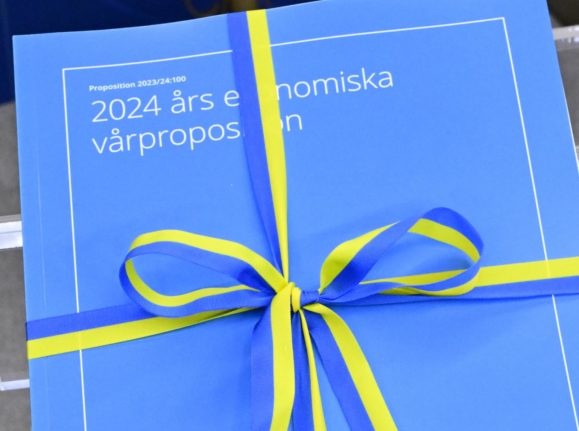Speaking at a seminar on Sweden’s economic situation hosted by Swedbank, Mikael Damberg agreed that the coming campaign would be a so-called plånboksval, or “pocketbook election”, where rising costs and falling spending power are the dominant issue, but he said he thought this would benefit rather than harm the Social Democrats.
“Economic issues will be very important,” he told The Local, “and I think people will think about who will be best in charge of the public finances, and who has been in government and handled tough situations, and I think that Magdalena Andersson, as the Prime Minister with seven years as Minister of Finance, is the right woman to lead Sweden in these difficult times.”
His worry, he said, was that Sweden’s political parties would respond to inflation levels of close to eight percent by promising voters subsidies and cash transfers to make up for rising prices, which if implemented would then risk fuelling an inflationary spiral.
“It might be |a problem] if the parties draw the wrong conclusion, and think that they can spend a lot of money right now. Because if they spend too much money, too broadly, not focusing on vulnerable groups, then inflation will go up, and interest rates will go even higher. And that would actually worsen the situation in the wallet for ordinary people.”
Instead, Damberg said that people living in Sweden would ideally simply tighten their belts and tolerate a period of falling real incomes.
“For 25 years in Sweden, we have had real wage increases for ordinary workers, and that’s kind of unique on an international perspective. So this year, there will be a drop in real wages because of inflation,” he said.
He said that he hoped that in next year’s negotiations between unions and employers over new collective bargaining agreements, unions were as responsible as they have been historically, and avoided calling for inflationary pay hikes.
“It’s tough. The war has made us all less rich, and some groups will be affected very much. But I think, there’s no point in getting wage increases if it pushes inflation higher. The trick here is to get wage increase that are for real, and not just on paper.”
In the seminar, he said that there was a danger that the huge emergency spending packages Sweden, like other countries, had put in place to soften the impact of the Covid-19 pandemic would set a precedent, leading voters and politicians to think it was possible for governments to spend their way out of the coming economic difficulties in a similar way.
His intention, he said, if he was reappointed finance minister after the election, would be to keep the tax rate roughly level with where it is now, neither raising nor lowering taxes, in the hope that Sweden’s state finances go into a small surplus next year.
He said it had been right this year to pass measures to increase the incomes of the poorest families and the poorest pensioners, and that his party would still seek to give aid targeted those least able to cope with rising prices.
“Politics has a role,” he said. “But you need to be careful not to create too big a role, because if you think that politics can do everything, then we will start fuelling inflation. It’s a lot harder now than it was in the pandemic.”
Shortly before the seminar, Ulf Kristersson, leader of the opposition Moderate Party, made a speech in which he accused the government of bringing in 46 new taxes over the last four years, and together in a “left-wing cartel” with other parties of planning a series of tax hikes, including a property tax, a tax on savings, a wealth tax, a tax on the highest incomes, and a reduced tax break on cleaners and other households services.
“I think they’re a bit desperate, because they’re not doing that well in the polls,” Damberg said. “So one way [of improving the situation] is to try to frighten voters. But I think our record speaks for itself, and I think Magdalena Andersson has got a lot of credibility when it comes to handling Swedish economy.”
“She has not introduced a property tax, and she has not in the last period in government increased the tax burden on ordinary people. If you look at the tax burden in Sweden over the last period, it’s gone down, not up.”



 Please whitelist us to continue reading.
Please whitelist us to continue reading.
Member comments